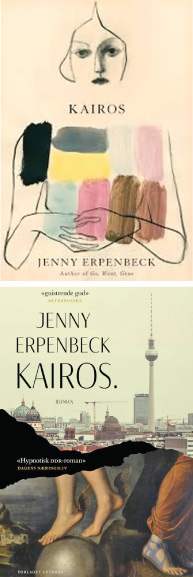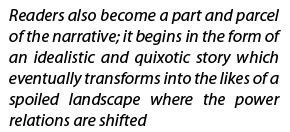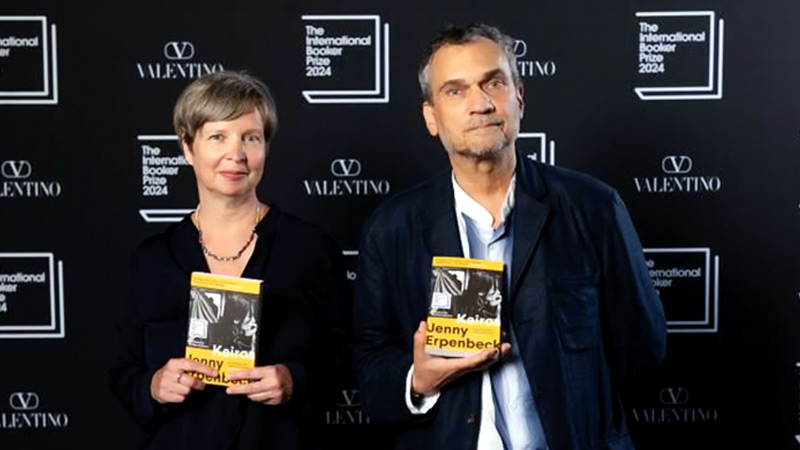I may still resist taking a break from my nostalgic indulgence on ‘Wind of Change’ sung by Scorpions, a West German rock band back in the days during which the fall of the Berlin Wall was a popular pow-wow in the city.
 Amid the monsoonal winds and thunder, I settle my thoughts on Katherina, a 19-year-old damsel and her lover Hans, a writer and TV presenter who is well into his 50s. Katherina and Hans are the protagonists of ‘Kairos’, the 2024, The International Booker Prize winning novel originally written in German by Jenny Erpenbeck. Michael Hofmann translated the novel into English.
Amid the monsoonal winds and thunder, I settle my thoughts on Katherina, a 19-year-old damsel and her lover Hans, a writer and TV presenter who is well into his 50s. Katherina and Hans are the protagonists of ‘Kairos’, the 2024, The International Booker Prize winning novel originally written in German by Jenny Erpenbeck. Michael Hofmann translated the novel into English.
The novel won the 2024 The International Booker Prize whilst making its writer and translator equally celebrated for their incredibly outstanding versatility in the domain of fiction writing and translation. 57 year old Erpenbeck was born in Berlin.
Though she is a celebrated novelist today, back then, her time was mostly spent on the direction of Operas. According to the BBC, Hofmann at 60 is undoubtedly the world’s most influential translator of German into English. He teaches at the University of Florida on a part time basis. Poetry and literary criticism are his forte.
With the announcement of the winner of this year’s The International Booker Prize, the editorials of the leading newspapers across the world were flooded with the articles written on the courageous and collective efforts taken by the novelist and translator alike; novelist Erpenbeck and translator Hofmann overnight became household names.
The celebrity status they enjoy is nothing but their carefully and sensibly used words, scattered around the novel. The International Booker Prize, 2024 was held at London’s Tate Modern on Tuesday, 21st May with the attendance of some high profile guests. Artist and author Edmund de Waal chaired this year’s panel of judges.
Love and politics
Within ‘Kairos’ is the prevalence of a phenomenal blend of love and politics. It has the symptoms and indicators of psychological materialism; it begins to convince its readers about the conditions that are surrounded by materialism which pave the way for Katharina and Hans to fall in love with each other despite the age gap of more than thirty years.
 Uncovering the intricacies and subtleties of the East German society was a flawless and immaculate elation which the readers may notice elsewhere in the story.
Uncovering the intricacies and subtleties of the East German society was a flawless and immaculate elation which the readers may notice elsewhere in the story.
A concerned reader may distinguish that the story is enriched with an addition of a symphonic essence which as ‘The Hindu’ writes could apparently be due to the operatic background of the novelist. The city of Berlin, though initially being the story’s setting, gradually emerges into the significance of an actual character.
Berlin airs the fleeting and momentary nature of love and the longing and yearning of the socialists. The forte of Erpenbeck is her knack for adding a mix of voices while maintaining a jittery and fidgety absence of quotation marks. Readers also become a part and parcel of the narrative; it begins in the form of an idealistic and quixotic story which eventually transforms into the likes of a spoiled landscape where the power relations are shifted.
A reader may find that ‘Kairos’ is arguably and invariably an absolute tapestry designed with metaphors and convoluted details which resolve and untangle the twists of a relationship tarnished and stained by sheer lies and eventual abuse. Fabulously set against the backdrop of the fall of the Berlin wall and the collapse of Communism in East Germany, it has the knack of providing an amazing, meaty and intriguing journey.
Nobel prize
Erpenbeck’s work has over the years grabbed the attention of the English language readers. She is among the most outstanding and demanding novelists that you have heard of. There remains no hyperbole to say that she is already bruited, rattled and clattered as a promising contender for a future Nobel Prize for Literature.
The ‘New York Times’ in its latest edition writes “But to absorb ‘Kairos’ is like reading ‘Wuthering Heights’ or ‘On Chesil Beach’, listening to albums like Lou Reed’s ‘Berlin’ or Tracey Thorn’s ‘A Distant Shore’ watching the film ‘Truly, Madly, Deeply’ or ingesting an ideal edible to set yourself on a gentle downward trajectory”. The history of love stories in literature has never been tiny parts, the greatest romantic stories almost in every inch end up with tragedies.
The pleasure experienced in sorrow repeatedly becomes an inseparable pain in the protagonists of the stories of such calibre. Ache, torment and twinge along with rapture and glee dance the tango in the engrossing masterpiece of Kairos. Erpenbeck is not just a so-called writer but an extraordinary and incredibly skilled icon with grownup words for a grownup audience of readers.
She has got an indubitably and undeniably gift that could showcase how our fury, thoughts, choices, intensity and resentments tramped and trodden with the passing of the passage of time and the unending transformations in the cause of history.
It is unequivocally this specific wider sense of life that Kairos takes off the carpet where Erpenbeck becomes an overnight synonym for a phenomenal novelist whilst Hofmann ends up being the most sought after translator in the umbrella of German into English; the novelist and translator duo pulse with their recollections, surrounded by the communist Berlin.
Erpenbeck is a metaphor that makes the upcoming romantic novelists aware that great love stories are not pages, written with childish and naive romances with laughable settings and words, but a pivotal force that goes beyond the parameters of jejune and puerile style of developing a story that would be a highly talked about masterpiece.
Russian culture
What makes renowned ‘Anna Karenina’ enduring and unforgettable is exceptionally the approach that Tolstoy makes to Anna’s doomed and blighted affair to dissect and assess Russian culture. Similarly, what makes ‘Kairos’ monumental in the way Erpenbeck uses Katharina and Hans’ ill-fated and incompatible affair to scrutinize communist Berlin.
Last but not least, I may settle with The Guardian to conclude “While the novel is indeed bleak in its view of love and politics, spending time with Erpenbeck’s rigorous and uncompromising imagination is invigorating all the way to the final page”.









